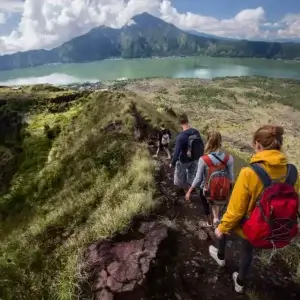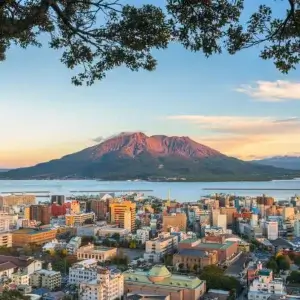Home / Compare Travel Insurance / Travel insurance with vo…

Key takeaways
Volcanoes are a powerful force of nature you can’t control, but you can purchase travel insurance if you’re going to a country with active volcanos. This page will explain what travel insurance for volcanic eruptions is, what it covers and how it could save you money.
- To get travel insurance with volcanic ash cloud cover you may need to purchase a comprehensive policy or top tier cover.
- If a volcano is erupting or is expected to erupt when you purchase a travel insurance policy, you’re unlikely to be covered for any costs related to this as it’s considered a ‘known event’.
- When planning your trip, it’s important to research your destination and check if it’s known to have volcanic activity so you can consider purchasing appropriate cover.
Expert tips for choosing the right travel insurance with volcanic ash cover for you
If you’re looking for help finding a suitable policy for your trip, our Executive General Manager of General Insurance, Adrian Taylor, has some tips to help you manage your policy.

Consider cancellation cover
Consider purchasing a comprehensive travel insurance policy with volcanic ash cover as soon as you make a booking and pay any deposits. That way, you’ll have cancellation cover from the start should a volcanic eruption cause you to cancel your trip before departing Australia. If you purchase cover after a volcanic eruption, you won’t be covered for any losses.
Think about what cover you need
When choosing a policy, go over your travel plans and identify what cover you may need for your trip like medical expenses, cancellation fees, luggage and rental vehicle excess. You may also want to purchase additional cover for things like cruise holidays or adventure activities.
Check your claim limits
Your claim limits will vary depending on your insurer and level of cover so make sure you’re comfortable with your coverage limits. For example, you might want higher limits for lost or stolen luggage if you’re travelling with expensive equipment or belongings. If you need to make a claim, keep any receipts for things you purchase with cash or your credit card due to the unforeseen event like accommodation, flights or food, so that you can claim for reimbursement of your expenses.
Learn more about travel insurance with volcanic ash cover
What is travel insurance with volcanic ash cover?

Travel insurance that covers volcanic eruptions reimburses some of your financial losses if an eruption sends your travel plans into a tailspin. This type of cover comes standard in some travel insurance policies; for other policies, you may need to purchase it as an add-on.
Travel insurance with volcanic ash cloud cover generally includes:
- Travel disruptions such as cancelled or delayed flights and tours (if your airline/tour operator hasn’t provided alternative flights or refunded you)
- Travel delay expenses, like food and accommodation costs
- Medical expenses incurred while overseas
- Overseas emergency medical evacuation
- 24/7 emergency assistance.
Cover for these things may be subject to exclusions, limits and restrictions. It’s always a good idea to check the policy wording of your Product Disclosure Statement (PDS), as your policy cover might differ between insurers. Also consider reading the Target Market Determination (TMD) to help you understand if a policy is suitable to your circumstances.
A possible scenario:
A volcano erupts near your upcoming destination before your trip can even take place, and you need to reschedule. Are you covered?
If you have travel insurance for volcanic eruptions that includes cover for cancellations, additional expenses and travel delays, your insurer should cover you up to the limits of the policy. You may be covered for cases where your flights are cancelled or significantly delayed, your activities and tours are cancelled, or you lose travel deposits and accommodation booking.
However, you can only claim if you purchase your travel insurance before the event, which is why it’s a good idea to buy a policy as soon as you make any bookings or pay any deposits.
What is excluded in travel insurance with volcanic ash cover?
It’s good to look out for any exclusions (events or incidences that aren’t covered) in your policy. When it comes to volcanic activity, these may include:
- Voluntarily cancelling your trip. Unless you’re at medical risk or your flights have been cancelled or significantly delayed, you usually won’t be covered for cancellations. Simply cancelling because you don’t want to go anymore is not a valid reason to seek compensation. For more information, check out our page on cancellations and delays.
- Ignoring travel warnings. If you act recklessly and do not heed government (or other) warnings, then it’s unlikely your insurer will pay your claim.
- If it was a known event. If the volcanic eruption was already a ‘known event’, meaning there were warnings and it had been mentioned on mainstream media when you made travel arrangements, then you typically won’t be covered. Typically, your travel insurance policy only covers unforeseen events (e.g. if the volcano began to erupt unexpectedly after you arrived).
- Purchasing cover after the eruption. To be covered, you must have purchased your travel insurance before the disaster takes place. Otherwise, your claim may not be accepted.
Remember to read your insurance policy’s PDS to know the inclusions and exclusions of your policy.
Case study: Bali, November 2017
In 2017, Mount Agung (an active volcano in Bali) erupted. As a result, Bali’s airport was closed, leaving thousands of tourists unable to fly in or out of the iconic tourist hotspot.
Many impending holidaymakers had their holiday cancelled while Bali tourists were left stranded in the chaos, with additional expenses (e.g. flights, accommodation, food, transport) added to their travel costs.
The tourists who purchased travel insurance with volcanic ash cover (before the volcano erupted and depending on the level of cover they chose) were in a position to lodge claims for these added expenses from their travel insurers.
However, not all policies will cover all losses you may incur because of a volcano eruption. You can find out more about a travel insurance policy through its PDS. When you compare travel insurance online with us, you can browse the PDS of each policy before you decide to buy.
Important to know
Current active volcanoes near tourist locations

Do you have a future travel destination in mind? If so, check if it’s volcanic, so that you can get covered. Here’s a brief list of some active volcanoes in or nearby popular travel destinations:
- Mount Agung, Bali
- Mount Merapi, Mount Ruang and Mount Rinjani in Indonesia
- Mount Stromboli, Mount Etna and Vesuvius in Italy
- Kilauea in Hawaii, USA
- Sakurajima, Japan
- Mount Yasur, Vanuatu
- White Island, New Zealand
- Eyjafjallajökull and the Reykjanes Peninsula, Iceland
Be aware, this is not a comprehensive list as the activity of volcanoes is ever-changing. For current information about your destination consider checking Smartraveller.
What happens if a volcano erupts while you’re on holiday?
First, follow any evacuation or shelter orders from the government. You should also contact your insurer as soon as possible. They may be able to direct you to emergency services, answer your questions and help organise alternative accommodation if needed.
Your insurer can also help you prepare the necessary documents so that you can claim on your policy.
Doesn’t my regular insurance already cover flight cancellations and delays?
Travel insurance only covers you for the specific events or incidences outlined in your policy’s PDS. So, if the cancellation cover in your policy doesn’t mention natural disasters, volcanos or ash clouds, then you’re probably not covered and any claims related to volcanoes may be denied.
Are medical expenses covered under travel insurance with volcanic ash cover?
Yes, travel insurance typically covers your overseas medical expenses. If you choose a policy that covers natural disasters like volcanic eruptions, you will generally be covered for unforeseen emergency medical costs relating to an eruption, including hospital care and emergency medical evacuation. The extent of your medical cover will vary between levels of cover, policies and insurers.
If you have pre-existing medical conditions, your cover may vary. Make sure to declare it to your insurer at the time you apply for a policy, otherwise any medical costs related to these conditions typically won’t be covered in the event of an eruption. Insurers may automatically cover some pre-existing conditions, while you may be able to purchase cover for others as an add-on, but it’s crucial to understand the coverage available to you before departing on your trip.
Meet our travel insurance expert, Adrian Taylor
As a General Insurance expert with over 13 years’ experience in financial services, Adrian Taylor believes in educating customers about the importance of travel insurance so that anyone can kick back and make the most of their time away from home. While no one wants a disrupted holiday, a suitable travel insurance policy can provide a financial safety net for yourself, your belongings and your trip in case things go wrong.


